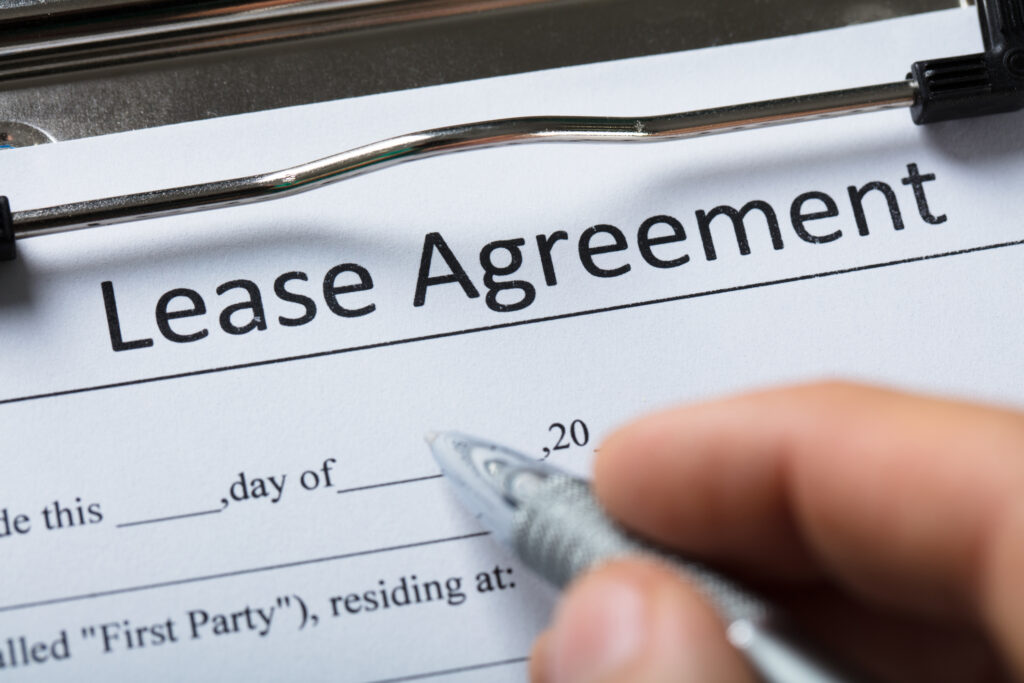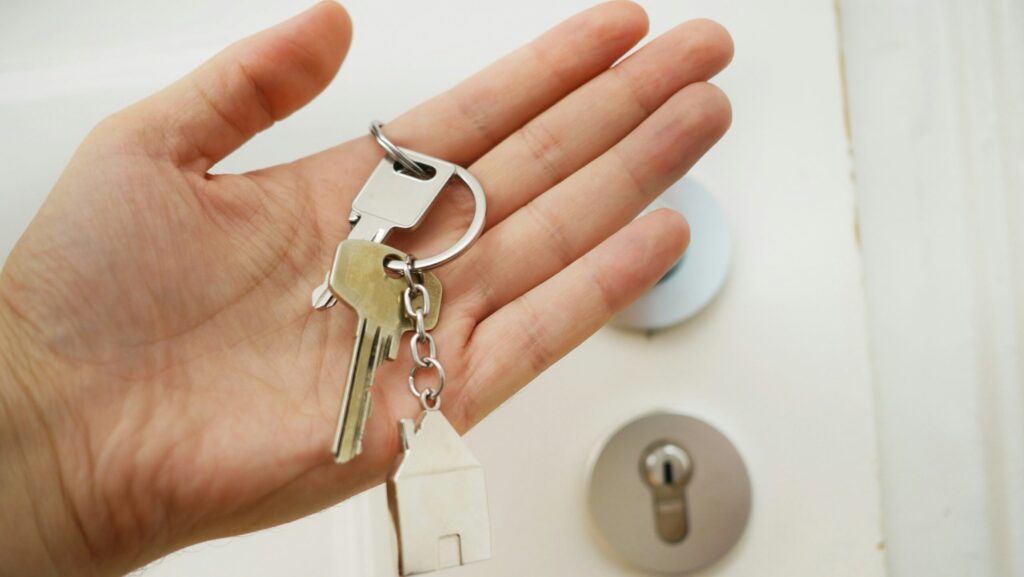Unlocking your apartment door for the first time is memorable. This step-by-step guide will walk you through the process – from the anticipation of finding the perfect place to the satisfaction of making it your own. Follow along as we cover the ins and outs of apartment hunting for the first time and empower you to navigate this journey with confidence!
- Determine the type of home you want to live in
- Create a budget
- Find your ideal neighborhood/city
- Consider a roommate
- What you want vs. what you need in a rental
- Know the best time to look for an apartment
- Consider the view, floorplan, and floor level
- Schedule a tour and have questions prepared!
- Get those documents ready
- Make sure you truly understand the lease!
- Move-in checklist
- FAQS
Determine the type of home you want to live in
As a first-time renter, one of the initial decisions to make is choosing the type of rental property that best suits your lifestyle and preferences. From spacious houses to cozy apartments, luxurious condos to versatile townhomes – each type of abode offers distinct features and benefits.
By exploring the characteristics of each option, you can confidently choose the perfect rental property that best suits your needs. In Connecticut, the most common types of rental properties typically include apartments, single-family homes, townhomes, and condominiums.
Create a budget
Mastering the art of apartment budgeting is imperative for first-time apartment renters, ensuring financial stability and peace of mind throughout your tenancy. While common budgeting pitfalls like underestimating expenses or overspending on non-essentials can easily derail your financial health; implementing proactive strategies such as creating a comprehensive budget, tracking expenses diligently, and setting realistic savings goals can empower renters to stay on track and achieve their financial objectives. Afterall, you want to be able to enjoy your new home with minimal stress!
The U.S. Department of Housing and Urban Development advises not to spend more than 30% of your gross income on rent. This is not always feasible, but a rule of thumb to consider. Try this rental calculator to get a sense of the apartment prices in your budget!
Additionally, it may help to use the 50-30-20 rule to help you navigate how you budget. This rule advises renters to allocate 50% of your budget for necessities, designate 30% for desires, and set aside 20% for savings. Do bear in mind that most landlords typically require your gross monthly income to be at least 3x the base rent!
Find your ideal neighborhood/city
When considering a neighborhood or city for your first apartment, there is certainly a lot to think about! Research crime rates, access to public transportation, proximity to work or school, and nearby amenities like grocery stores, parks, and entertainment options. Take time to explore different neighborhoods, visit local attractions, and talk to residents to get a feel for the community and determine if it aligns with your hopes and expectations.
One common mistake people make when choosing a neighborhood to move to is not thinking about their long-term needs and priorities. Focusing solely on immediate wants (attractions or amenities) without considering factors like future career opportunities, school districts, or community dynamics can lead to dissatisfaction down the line.
Don’t solely rely on online research without visiting the neighborhood in person! This could result in overlooking crucial aspects such as neighborhood vibe and noise levels. Lastly, not considering the cost of living in the desired neighborhood can lead to financial strain or difficulty maintaining the desired lifestyle after the move.
Check out our neighborhood guides for Lower Fairfield County.
Consider a roommate
Affording rent on your own is hard! It’s common for individuals to split the rent. Landlords often allow multiple people to be named on the lease, and they may consider the combined income of all tenants when determining eligibility. This can be particularly helpful for individuals who may not meet the income requirements on their own but can do so when combining incomes with a roommate or partner.

It’s important to note that landlords typically require each tenant to pass a background and credit check, and they may have specific criteria regarding income and rental history. Additionally, all tenants are usually jointly responsible for paying the rent and adhering to the terms of the lease, including any damages or liabilities incurred during the tenancy.
Before entering into a lease agreement with a roommate, it’s advised to discuss expectations, responsibilities, and financial obligations thoroughly to ensure a mutually beneficial living arrangement.
What you want vs. what you need in a rental
Determining your wants versus your needs is crucial for your first apartment, as it ensures you prioritize essential factors like location, budget, safety, and space while also accommodating amenities, aesthetics, and lifestyle conveniences. By striking a balance between what you require for comfortable living and what you desire for an enjoyable experience, you can find a rental that meets both your practical needs and personal preferences, creating a fulfilling and satisfying living environment.
PRO TIP: Break these down into a list. Sometimes a compromise is a good thing, and saving money is never a bad thing!
Know the best time to look for an apartment
If you’re able to be flexible with your move-in date – which isn’t always the case, timing can greatly impact your rental search in terms of both competitiveness and cost-effectiveness. Rent prices often fluctuate seasonally, presenting opportunities to save by strategically timing your apartment hunt. Typically, securing an apartment during the winter months yields the best deals. Let’s take a closer look:
Spring and Summer: These seasons often see an increase in rental activity, as warmer weather and longer days make moving more appealing. Additionally, many leases tend to end during the summer months, leading to higher demand for available units. As a result, rent prices may rise, and competition for desirable apartments can be fierce. However, landlords may offer incentives or concessions to attract tenants.
Fall: As summer transitions into fall, rental demand may begin to taper off slightly. Families with school-aged children typically aim to move before the start of the school year, leading to a decrease in competition for rentals. Landlords may be more willing to negotiate on rent prices or offer move-in specials to fill vacancies before the slower winter season sets in.
Winter: This is often considered the off-peak season for the rental market. With fewer people looking to move during colder months, landlords may struggle to fill vacancies, leading to decreased competition among renters. Consequently, this can result in lower rent prices and more flexible lease terms. Landlords may be more receptive to negotiation, offering incentives such as reduced rent or longer lease terms to secure tenants.
Aside from seasonal fluctuations, specific times of the month can also impact rental prices. For example, apartments may be more affordable towards the end of the month when landlords are eager to fill vacancies and avoid carrying costs into the following month. Ultimately, understanding the seasonal rhythms of the rental market can empower first-time renters to make informed decisions and secure the best possible deal on their new apartment. By strategically timing their search and being flexible with move-in dates, renters can maximize their chances of finding an affordable and desirable rental property!
Consider the view, floorplan, and floor level
When it comes to apartment living, there’s more to consider than just location and amenities. Delving into specifics like floorplans, views, and preferred floor level can significantly impact your living experience. Choosing the right floor plan can optimize space and functionality, whether you prioritize open-concept layouts for entertaining or separate bedrooms for privacy. The floorplan is especially important if you work hybrid or remote.
Selecting an apartment with a desirable view – whether it’s a scenic landscape, city skyline, or tranquil courtyard – can enhance your daily life and create a sense of serenity within your home. Moreover, deciding on the ideal floor level involves balancing factors like accessibility, noise levels, and personal preferences – whether you prefer the convenience of ground-floor living or the elevated views and added privacy of higher floors. By carefully considering these factors, you can find an apartment that not only meets your practical needs but also makes you happy.
Schedule a tour and have questions prepared!
Scheduling a tour of potential apartments is a pivotal step in the renting process, offering insight into your prospective living space. Equally important is arriving prepared with a list of questions that address your needs and concerns. This proactive approach empowers you and helps you make well-thought decisions.
By asking these questions during the tour, you can gain valuable insights into the property, management style, amenities, lease terms, and neighborhood. With this information you’ll be able to make an informed decision about whether this particular rental is the right fit for your needs and preferences.
Get those documents ready
Having the correct and required documentation prepared makes your life way easier. Landlords typically require certain documents as part of the rental application process. These may include proof of income (such as pay stubs and or employment verification), valid identification (such as a driver’s license or passport) and references from previous landlords.
Sometimes it can be challenging for first time renters as they do not have prior apartment living history and often times lack sufficient credit. If you find yourself in this position, there are several ways to attempt to overcome this:
- Provide alternative proof of financial responsibility: If lacking a credit history or rental history, providing alternative evidence of financial responsibility such as proof of income or savings can strengthen your rental application.
- Offer additional references: Offering references from employers, academic institutions, or personal references who can vouch for your reliability and trustworthiness can sometimes help compensate for the lack of rental history.
- Offer a larger security deposit: Some landlords may accept a larger security deposit as a form of assurance against the perceived risk of renting to someone with limited credit or rental history.
- Find a guarantor or co-signer: Having a guarantor or co-signer with a strong credit history and stable income can reassure landlords and increase the likelihood of approval for the rental application.
- Look for rentals with flexible requirements: Some landlords or property management companies may be more lenient with their rental criteria, especially for first-time renters. Searching for rentals in such properties can increase the chances of approval.
Once you’ve gathered all your paperwork and completed all necessary forms, it’s time to submit your application along with the required fee (waived in Connecticut).
Make sure you truly understand the lease!
Understanding the lease is paramount for first-time renters as it serves as the foundation of the landlord-tenant relationship, dictating the terms of your occupancy and the obligations of both parties. Without a clear understanding of the lease, renters may find themselves unaware of crucial provisions that could impact their living arrangements and financial obligations.

One common misconception among first-time renters is the belief that all leases are standard and uniform. In reality, leases can vary significantly depending on the landlord, property type, and local regulations. Failure to carefully review and understand the specific terms of your lease could result in unexpected surprises or disputes.
Additionally, first-time renters may overlook clauses related to maintenance responsibilities and fees. Understanding who is responsible for routine maintenance tasks, repairs, and utilities can prevent misunderstandings and disputes with the landlord down the road. Another misconception is underestimating the importance of lease renewal and termination terms. Renters may assume that they can easily break their lease or renew it without issue, only to find themselves bound by strict deadlines and penalties. Understanding the lease renewal process and early termination clauses can help renters plan accordingly and avoid potential financial consequences.
By taking the time to thoroughly review and understand the lease, first-time renters can protect their rights, avoid misunderstandings, and ensure a healthy renting experience. Consulting with a legal professional or housing advisor may also be beneficial in clarifying any confusing or complex lease terms. If you don’t understand something, ask!
Move-in checklist
Creating a move-in checklist is a smart way to have a smooth transition into your first apartment. Here’s a breakdown of essential tasks to include:
Set up utilities
Arrange for gas, electric, and water/sewer services to be transferred into your name before moving in. Contact the utility providers in your area to set up accounts and schedule service activation. Here is a guide to understand utilities in Connecticut.
Purchase home essentials
Make a list of essential items you’ll need for your new apartment, such as furniture, kitchenware, bedding, and cleaning supplies. Prioritize purchasing these items before moving in to ensure a comfortable living space from day one. Don’t forget useful things such as snacks and tools for move-in day!
Get renters insurance
Protect your belongings and liability with renters insurance. Research insurance providers and policies to find coverage that meets your needs and budget. Be sure to have your policy in place before moving in!
Get moving supplies
Stock up on moving supplies such as boxes, packing tape, bubble wrap, and markers. These items will help you pack and protect your belongings during the move. It can be a good idea to rent or purchase any necessary moving equipment, such as dollies or moving blankets.
Hire a moving company
If you’re considering hiring movers, research moving companies in your area and book your move well in advance. Obtain quotes, verify insurance coverage, and confirm the details of your move with the chosen company.
By following this move-in checklist, you can streamline the moving process and guarantee that you’re fully prepared for your transition into your first apartment. Don’t forget to double-check your list and address any additional tasks specific to your situation before moving day arrives.
FAQS
Is there an age requirement to rent?
The legal age to rent an apartment varies depending on state and local laws. In most states, individuals must be at least 18 years old to enter into a legally binding contract, including a lease agreement. However, some states may allow minors to enter into contracts with parental consent or under specific circumstances.
Before renting an apartment, it’s essential to review the legal age requirements in your state and ensure that you meet the minimum age criteria. Landlords may ask for proof of age, such as a driver’s license or state-issued identification, during the rental application process.
I am a student, can I rent?
Yes, students can rent apartments, but they may face some unique challenges compared to working professionals. Landlords may require students to provide additional documentation or have a guarantor co-sign the lease due to their limited income or credit history. Additionally, students may need to consider factors such as proximity to campus, transportation options, and roommate preferences when apartment hunting.
It’s essential for student renters to communicate openly with landlords and provide any necessary documentation to demonstrate their ability to meet the rental requirements. Exploring options such as student housing, roommate matching services, or off-campus housing resources can also help students find suitable rental accommodations.
How much should I have saved beforehand?
Before renting your first apartment, it’s essential to save enough money to cover various upfront costs. These may include:
- Security deposit: Typically equivalent to one or two months’ rent (but not always), the security deposit serves as protection for the landlord against any damages to the property.
- First month’s rent: Landlords usually require tenants to pay the first month’s rent in advance before moving in.
- Application fees: Some landlords or property management companies may charge application fees to cover the cost of background checks and credit checks (waived in Connecticut).
- Moving costs: Budget for moving expenses such as hiring a moving company, renting a truck, or purchasing packing supplies.
By saving enough money to cover these upfront costs, you’ve made your transition into your new apartment that much smoother. Ultimately, it is up to you to consider your current and future financial situation as well as what you feel comfortable with before moving.
Can I negotiate the terms of the lease, such as the rental price or lease duration?
Yes, it is possible to negotiate certain terms of the lease, such as the rental price or lease duration, although the extent to which you can negotiate may vary depending on the landlord or property manager’s policies and the local rental market conditions. Before negotiating, it’s advised to research comparable rental properties in the area to understand the market rates and determine a reasonable price range.
When negotiating, be polite, professional, and prepared to provide reasons to support your requests, such as good credit history, stable income, or signing a longer-term lease. Keep in mind that landlords may be more willing to negotiate during off-peak rental seasons or if the unit has been on the market for an extended period. Ultimately, the success of your negotiation will depend on various factors, including the landlord’s willingness to compromise and the specific circumstances of the rental agreement.
How do I know the building is secure and safe?
This differs if you are in a townhome or a single-family home. However, common security measures at apartment complexes or buildings may include:
- Secure entry systems
- Surveillance cameras
- Well-lit areas
- On-site staff
- Fencing and gates
- Alarm systems
- Community policies
- Emergency preparedness
For more information, check out: 15 Essential Amenities That Ensure Safety.
Your first apartment awaits!
You made it – congratulations! Now you can confidently navigate the apartment renting process. With careful planning, communication, and attention to detail, you can secure your dream home! Happy hunting!

